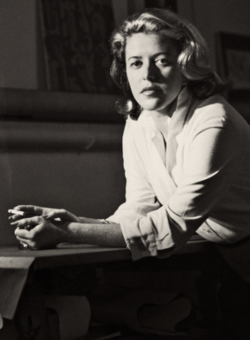Hilda Hilst

Hilda de Almeida Prado Hilst (April 21, 1930 – February 4, 2004), more widely known as Hilda Hilst, was a Brazilian poet, playwright and novelist, whose fiction and poetry often drew upon themes of delicate intimacy, while also addressing the topic of insanity and incorporating supernatural events. Several of her late works include elements of magic realism.
Early life and studies
Hilst was born in Jaú, São Paulo State, Brazil. After attending the Colégia Santa Marcelina in São Paulo, she studied at Mackenzie Presbyterian Institute in the same city from 1945 to 1947. In 1948 she enrolled in the Law School at Faculdade de Direito da Universidade de São Paulo (Largo São Francisco), finishing it in 1952. There she met her best friend, the writer Lygia Fagundes Telles. In 1966, Hilda moved to Casa do Sol (Sunhouse), a country seat next to Campinas, where she hosted an array of writers and artists for several years.
She died in Campinas.
Career
Hilda Hilst wrote for almost 50 years, and collected the most important Brazilian literary prizes. Her work proceeded in several stages: she began as a poet, publishing Presságio in 1950; started publishing and staging plays in 1967; and shifted into prose in 1970, with her experimental text Fluxo-Floema. Throughout her career, beginning in 1958, with Adoniron Barbosa, musicians selected poems of hers to be set to music.[1]
In 1962 she won the Prêmio PEN Clube of São Paulo, for Sete Cantos do Poeta para o Anjo (Massao Ohno Editor, 1962). In 1969, the play O Verdugo took the Prêmio Anchieta, one of the most important in the country at the time. The Associação Brasileira de Críticos de Arte (APCA Prize) deemed Ficções (Edições Quíron, 1977) the best book of the year. In 1981, Hilda Hilst won the Grande Prêmio da Crítica para o Conjunto da Obra, by the same Associação Brasileira de Críticos de Arte. In 1984, the Câmara Brasileira do Livro awarded her the Jabuti Prize for Cantares de Perda e Predileção, and the following year the same book claimed the Prêmio Cassiano Ricardo (Clube de Poesia de São Paulo). Rútilo Nada, published in 1993, took the Jabuti Prize for best short story, and finally, on August 9, 2002, she was awarded at the 47th edition of Prêmio Moinho Santista in the poetry category.
From 1982 to 1995 Hilst participated in the Programa do Artista Residente (Artist-in-Residence program), at the Universidade Estadual de Campinas - UNICAMP. Since 1995 her personal files have been in IEL-UNICAMP and are available to researchers worldwide.
In several of her writings Hilst tackled politically and socially controversial issues, such as obscenity, queer sexuality, and incest. The tetralogy that comprises O caderno rosa de Lori Lamby and Contos d'escárnio. Textos grotescos (1990); Cartas de um Sedutor (1991); and Bufólicas (1992), includes overtly pornographic material, if not "pornography" per se.[2] She explored theological issues in her work as well.
Translation
A number of Hilst's books were originally published by smaller Brazilian publishers, but beginning in 2001, Editora Globo, the publishing branch of the Brazilian media organization Globo, began reissuing nearly all her works, as part of its Coleção Reunidas de Hilda Hilst.,[3][4] Some of her texts have been translated from Portuguese to French, English, Italian and German. In March 1997, her works Com meus olhos de cão and A obscena senhora D were published by Éditions Gallimard, translated by Maryvonne Lapouge. A obscena senhora D was translated into English as The Obscene Madame D collaboratively by Nathanaël and Rachel Gontijo Araújo, and published jointly by Nightboat Books in New York and A Bolha Editora in Rio de Janeiro in 2012.[5] In 2014, Letters from a Seducer, John Keene's translation of Brazilian Hilda Hilst's 1991 novel Cartas de um sedutor, was published by Nightboat Books and A Bolha Editora,[6] and With My Dog Eyes, Adam Morris's translation of Hilst's 1986 novella Com os meus olhos de cão, was published by Melville House.[7]
Further reading
- Bueno, M. A., & Hilst, Hilda (1996). Quatro mulheres e um destino: Hilda Hilst, Fernanda Torres, Fernanda Montenegro, Eliane Duarte. Rio de Janeiro, UAPE. ISBN 85-85666-17-X
- Pécora, Alcir (org.), Luisa Destri, Cristiano Diniz, and Sonia Purceno (2010). Por que ler Hilda Hilst. São Paulo: Editora Globo. ISBN 85-25048-45-3
- Querioz, Vera. (2000). Hilda Hilst: três leituras. Editora Mulheres. ISBN 85-86501-22-0
- Siqueira de Azevedo Filho, Deneval (2007). A bela, a fera e a santa sem a saia: ensaios sobre Hilda Hilst. Vitória: GM Gráfica e Editora. ISBN 85-99510-20-7
References
- ↑ Por que ler Hilda Hilst, Alcir Pécora (org.), Luisa Destri, Cristiano Diniz, Sonia Purceno. São Paulo, Editora Globo, 2005, pp. 57-62.
- ↑ Alcir Pecora (March 2004). "Hilda Hilst has died. Long live Hilda Hilst!". Pesquisa FAESP.
- ↑ Por que ler Hilda Hilst, Alcir Pécora (org.), Luisa Destri, Cristiano Diniz, Sonia Purceno. São Paulo, Editora Globo, 2005, pp. 109-111.
- ↑
- ↑ "Nightboat Books". Nightboat.org. Retrieved 2015-06-04.
- ↑ "Letters from a Seducer: Hilda Hilst". UPNE.com. Retrieved 2015-06-04.
- ↑ "With My Dog Eyes » Melville House Books". Mhpbooks.com. Retrieved 2015-06-04.